East Los Angeles College (ELAC) is one of nine colleges in the Los Angeles Community College District serving the communities on the eastern border of the City of Angels. Since its founding in 1945, ELAC has grown from a small college operating out of a local high school to a thriving community partner enrolling over 35,000 full-time students.
My visit to ELAC was fast and full, much like the feeling of the wider Los Angeles community. I was inspired by the personal commitment shared by the team members, by the growing number of programs designed to serve students, and the excitement and gratitude shared by the students that ELAC serves. President Dr. Alberto J. Román was gracious enough to introduce his institution and his team, and shared his commitment to meaningfully address social justice and racial equity at the college.
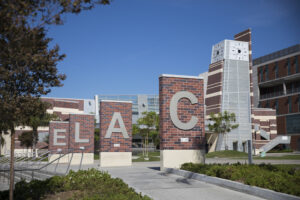

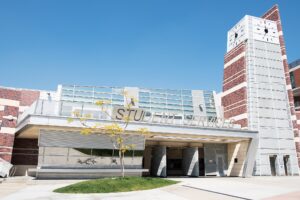
One of the most impressive programs at ELAC is the Latina Completion and Transfer Academy, which grew out of a desire to support Latina students in course completion and evolved into a dynamic, creative and comprehensive program empowering Latina students and others in their success. Below is information the college provided about the program as well as three heartfelt student testimonials.
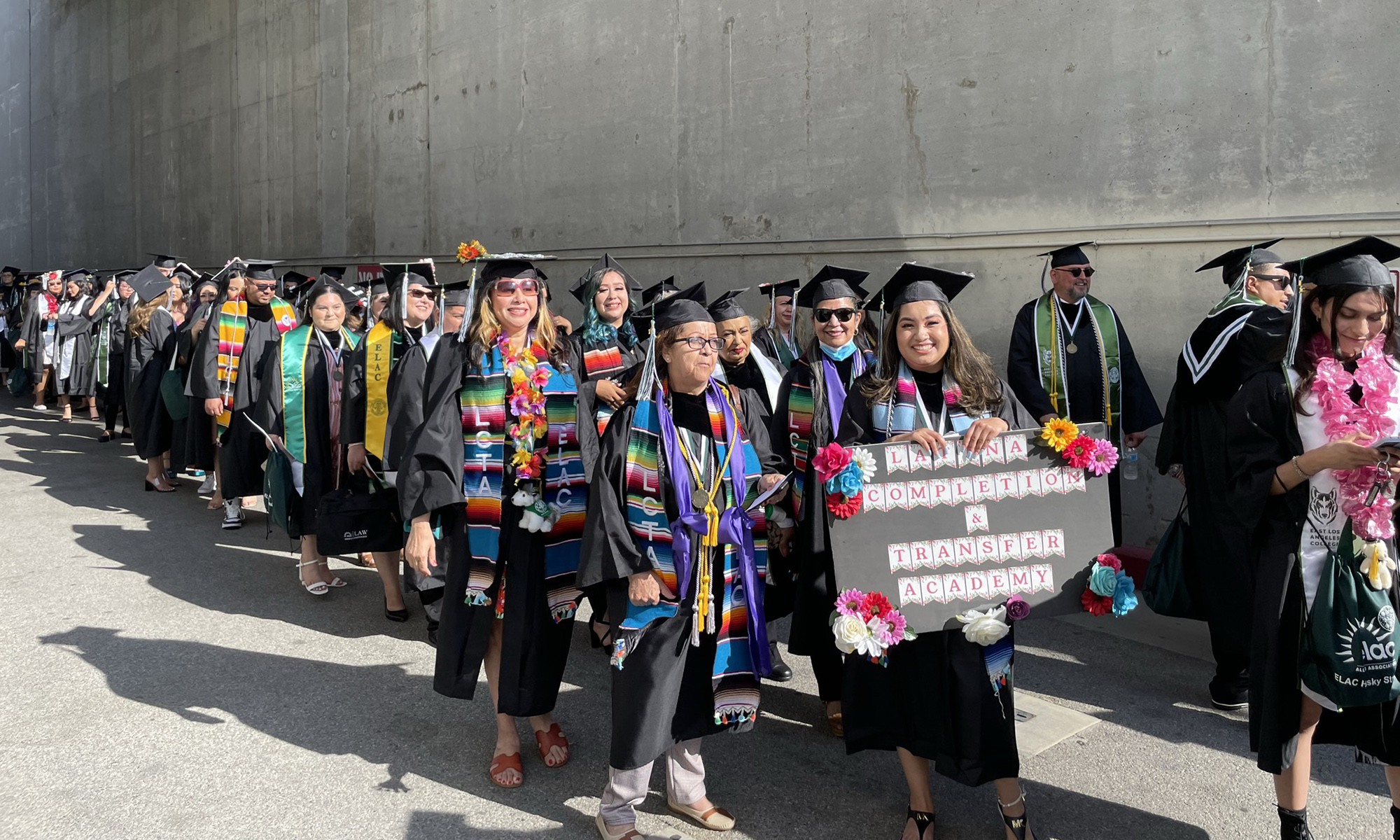
History of the Program and Key Elements
The Latina Completion and Transfer Academy (LCTA) began as the college assessed and identified that Latina students needed assistance in completing certain classes to achieve their academic goal of a certificate, graduation (degree), and for some to transfer. In 2015, ELAC created the Latina Leadership program to empower Latinas taking classes at East Los Angeles College (ELAC). The program assisted students with community engagement, field trips, and empowerment workshops. The students enjoyed and appreciated the empowerment aspect of the program, but one component was missing: the ability to pass their classes.
As a result of being the head of their household or taking care of their elders or children, Latina students were dropping or not passing classes because times were inconvenient. In late 2015, the department heads held a Latina Students Advisory Committee series. After a series of meetings, we created a cohort of Latina students with counseling support, mentorship, and wraparound services, giving birth to The Latina Completion and Transfer Academy.
LCTA is an evening program that is responsive to the needs of the students. The program identified the most challenging classes for our Latinas: Math 115, 125, and 227, English 101 and 103, and Biology 03. The program started with about 60 students. After the first cohort, we noticed that a few passed and many didn’t; therefore, we implemented tutoring as a program requirement for students. In some cases, we found that tutoring lab hours and teacher collaboration were missing.
The only class with high success was Math 227. As it turns out, a student was helping other students by providing a form of embedded tutoring. This one-on-one tutoring became their weekend ritual; they did potlucks and spent weekends studying with this student’s help. The program subsequently adopted embedded tutoring and worked with the professors to ensure student success.
Staff started promoting the LCTA to students taking a lower level of math / English. The program coordinators reviewed students’ transcripts to allow early detection of unsuccessful course completion or courses needed for them to complete their academic goals. Staff also provided them with an Academic Counseling appointment to ensure students were placed in classes to meet their certificate and degree requirements. The team also provided our students with professional and personal growth workshops. The program is family-oriented, offering creative and educational activities for the children guided by the staff, which allows the children to be out of the room for difficult topics, such as domestic violence or sexual abuse. The team also holds culturally sensitive and fun activities for the children, like a Posada in December and Halloween trunk or treat in October. Some of our students are parents and are in class during Halloween; thus, having activities makes up for a fun night for the kids.
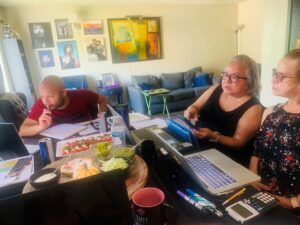
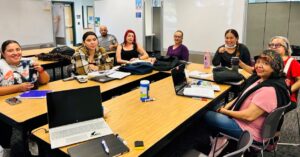
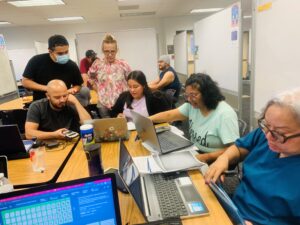
The beginning of the semester is filled with ice-breaking activities during our meet and greet. Our students meet with their professors, tutors, and classmates during this event. There is always food at our events; we feel that this helps create community and removes some of the anxiety of meeting new people. Despite the successful and significant gains with the program, something still needed to be added. Our students felt they worked hard to complete these classes and wanted to show off their accomplishments during graduation. For the first graduating class, all the coordinators pitched in. They purchased graduation sarape stoles for the students showcasing their graduation year (2016) on one side and LCTA on the other. To celebrate the students, we had a barbecue on campus for the graduates and their families. The following year, the staff started a student club to fundraise for the stoles and barbecues. During the first graduation, our Latina scholars stood out with their bright-colored sarape stoles. And with simple word of mouth, we had students coming to our office asking for help with their educational goals. The staff does not turn anyone away. In fact, we have men asking if they had to identify as Latina women to be part of the program. People of all ethnicities come asking us if they also need to identify as Latina women because they want to be part of the program and take advantage of the services. Our staff welcomes all students in the program who are willing to put in the time to attend tutoring and counseling sessions. With this support and success, we now have more than 200 students in the program.
During the pandemic, the team connected our students with campus resources, such as free laptops and hotspots, and made everyone in the LCTA team available to walk the students through the first few weeks of virtual learning. During the pandemic, we still held virtual workshops, meet-and-greet sessions, and end-of-the-semester virtual mixers because we felt it was essential to keep our students motivated. Our first face-to-face event was the wonderful drive-through graduation, where we could hand out our beautiful sashes to around 20 students. This June, we were able to sponsor sashes for our 35 graduates once again. The pandemic impacted the program; however, we expect that the program will grow back up to the numbers before the pandemic. There is tremendous interest, and the success of the program attracts many students to join.
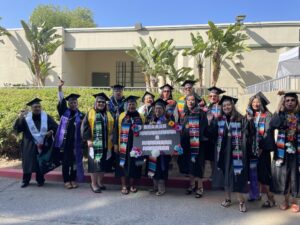
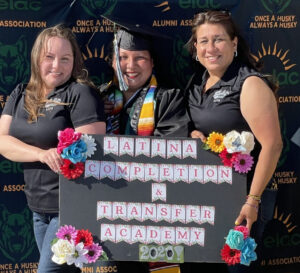
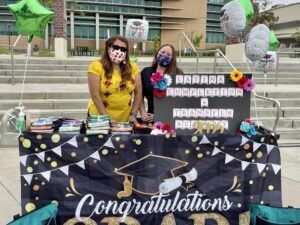
Services Provided by the LCTA Program:
- Evening classes for non-traditional students (night shift students). Classes meet after 6:50 pm to fit with the “non-traditional” student.
- Office computers set with the CSU Mentor quick link; allow for less student frustration and/or confusion as they begin their transfer application.
- Grade checks for students taking the same course for the second time (or more). Grade checks will be due three times per semester to better track and aid students in successful course completion.
- Studying resources for all students. We offered textbook and calculator lending services, budget-paid Math digital programs, scantrons, pencils, pens, and highlighters.
- SI tutoring services in classes. The SI tutors develop an academic connection with the class professor to better deliver tutoring intended to reinforce and strengthen concepts learned in class. SI tutors also assist with homework completion and preparation for upcoming exams. In-class tutors with additional tutoring scheduled specifically to meet students’ schedules.
- Culturally competent instructors taught the courses.
- Meet and Greet before the start of every semester. Students meet professors, SI tutors, LCTA staff, and classmates in a fun, stress-free environment to break the ice and feel a sense of belonging.
- LCTA student meetings/workshops. Providing family-friendly activities allows for higher student attendance.
- Monthly workshops to guide our students to self-efficacy. Promote other workshops on campus via social media. We ensure we do not duplicate efforts.
Coordinator / Mentor Roles:
- Focus on mentoring students who have yet to succeed in a course before becoming a fourth attempt student.
- Be available to nurture a less stressful and chaotic environment where students can ask questions, use the space or even comfortably take their exams when the DSPS office is closed.
- Listen and guide students academically and personally when needed.
- Provide office space for non-traditional students.
- Create a welcoming environment for all students, regardless of student gender, orientation, and cultural background.
Past Services that assisted our students to succeed pre-pandemic:
- Offer textbook lending services to remove the financial barriers that deter students from achieving their academic goals.
- Build leadership skills through mentoring and scaffolding efforts from the advisors through the Latina Completion Club meetings.
- Build community through self-efficacy and leadership skills. In collaborating with Gloria Molina and Monica Garcia, a few students were named the Latina Leaders.
- Schedule field trips and conferences to expose our students to other communities, resources, and support.
Office Coordinators / Staff:
LCTA are Child development, English, and Rehabilitation Services majors who can better assist students with similar interests.
Program goals:
- Support our students with an embedded tutor.
- Select culturally responsive instructors who understand where our students are coming from as well as their extra support and needs.
- Assist students with their educational journey needs through a counselor’s support available during the non-traditional evening and weekend hours.
- Assist students with care needs such as technology, food, transportation, and materials.
We hope to continue supporting our students complete and/or transfer with these practices and resources and new ones we can implement.

To learn more about East Los Angeles College, visit their website at https://www.elac.edu/.





